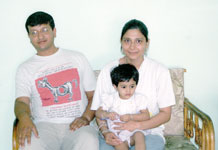Inter-religious couple marries despite cultural beliefs

Despite social stigmas against inter-religious union, Aniket Alam, a Muslim, and Manjari Katju, a Hindu, married in 1992.
Defying the norm: it is the only way to make change. And one family is doing just that.
Manjari Katju, a Hindu woman, and Aniket Alam, a Muslim man, married despite a national traditional belief that inter-religious marriage should never occur.
“We decided on one thing: there would be no religion in our marriage,” Alam said.
Katju comes from a fairly liberal Brahmin (Hindu) family that follows many Western practices.
“But they’re very political that marriages should be in the family,” she said. “They are very particular about keeping marriage in the community.”
So going as far as marrying outside her religion caused some disruptions in Katju’s family life. She said her immediate family had few problems with her marriage to Alam.
“My two brothers and parents were very cool about it,” she said. “They were very cooperative.”
She said it was her aunts, cousins, etc. that had problems.
“But since my parents weren’t against it, the rest of the family didn’t say anything beyond snide remarks,” Katju said.
Although Katju was raised in a fairly liberal family, as a Hindu, she still grew up expecting an arranged marriage. Her relationship with Alam was and is definitely out of the ordinary.
“It was some sort of a bold decision for me,” she said.
Alam, by Indian standards, grew up in a liberal family. His parents, Javeed Alam and Jayenti Guha, also married inter-religiously. His father, although culturally Muslim, is an atheist. Alam has followed in his father’s footsteps.
“In my memory, I never remember seeing him pray,” Alam said about his father. “Consciously, he’s a nonbeliever.”
Along with being liberal religiously, so is Alam’s family politically. His grandfather, Syed Alam, helped found the communist party in India in 1938. Syed allowed his wife to smoke, drink and eat pork. She did not always have to wear a burqua, she cut her hair short and she drove a car. All of these practices go against traditional Muslim beliefs.
“In that sense, he was a very progressive man,” Alam said.
As such a “progressive” family, therefore, no one had any problems with Alam’s marriage to Katju.
“It was more cross-cultural than cross-religious,” Katju said.
The two were introduced to each other in 1991 while attending the University of Delhi.
They met during the time of the Gulf War at a demonstration protesting the United States’ involvement in the war.
Through mutual friends and a sharing of political beliefs, Katju and Alam became closer.
They eventually married in December 1996. They were married in court with their parents as witnesses. But the wedding was not as easy as planned.
“We wanted a simple marriage and ended up with four receptions,” Alam said.
Thanks to liberal families and strong personal sentiment, Katju and Alam have had few religious difficulties in their marriage. But obstacles have arisen elsewhere.
Katju is two years older than Alam. Typically, the man is older than the woman in Indian relationships.
Because Alam is younger than Katju, she said many people still find their marriage strange.
“Friends and compatriots didn’t even understand,” she said.
In addition to the age difference, Katju and Alam based their living situation on her career.
Once again, the couple went against Indian standards. Generally, the wife should follow the husband.
After both worked for a short while in Delhi, Katju and Alam relocated.
Katju had applied at the University of Hyderabad, and she got the job in October 2000.
“So I also left,” Alam said. “She got a job first, and I stayed at home. To me, it wasn’t a big deal. But people do find it awkward.”
Alam eventually got a job as a writer for the newspaper, The Hindu, in May 2001.
In December 2001, the couple adopted a young girl. They saw her at an orphanage in November when she was about 4 months old.
Although the girl was malnourished and suffered from several ailments, Katju and Alam adopted her.
The couple will raise their daughter with no religion.
“We are very clear on that,” Katju said. “There are no two views or debate on that.”
They named her Sara Aparajita. Her first name is Persian, for the Hindu religion, and her second name is Sanskrit, for the Muslim faith.
“So she’s a symbol of Hindu-Muslim unity,” Katju said.
Like father and mother, like daughter.
Your donation will support the student journalists of Missouri Southern State University. Your contribution will allow us to purchase equipment and cover our annual website hosting costs.



























